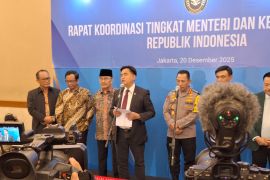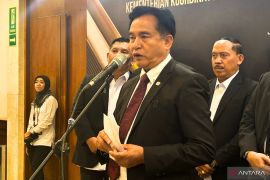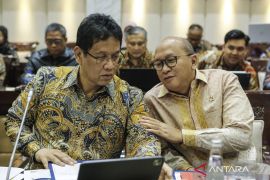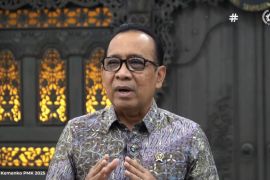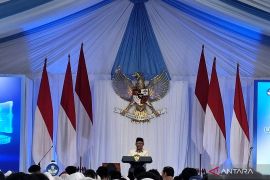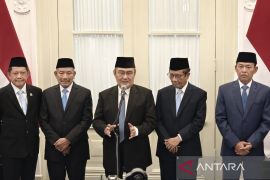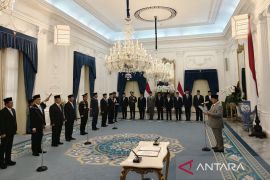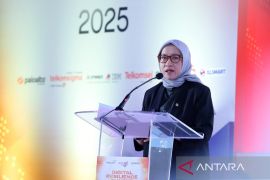"This is a good performance, unexpected and is very extraordinary," Executive Director of the Center for Indonesian Taxation Analysis Yustinus Prastowo said.Jakarta (ANTARA News) - The tax amnesty program launched in July 2016 is a big step by the government toward reform in the countrys taxation system.
Redemption and repatriated funds as part of the program are expected to make up for shortfall in tax revenues in the past several years to finance President Joko Widodos priority program of massive infrastructure development.
The days after launch of the program were marked with skepticism especially as realization looked sluggish that observers said that it was doomed to total failure.
Government critics said the program was against the state Constitution and it was unfair to those who regularly paid taxes.
Even those in favor of the program blamed the government for poor preparations.
Weeks after the program was launched on July 18, 2016, realization in asset declaration and repatriation was far from expectation despite interest shown by business people.
Thousands of the countrys business leaders who dominated business in this southeast Asian largest economy flocked to conventional halls where President Joko Widodo or popularly known as Jokowi, accompanied by his competent Finance Minister Sri Mulyani Indrawati giving details of the program.
Jokowi explained the benefits from the program not only to the country but also to the business people as well.
Sri Mulyani even warned that after the end of the program, failure to pay tax or tax evasion would be legally charged.
She said in 2018 Indonesia would be the first to join the group of countries adopting Automatic Exchange of Information (AEOI).
AEOI would provide automatic exchange of tax information among the members of the group. All bank accounts in the world would be accessible for investigation of taxable assets.
Dishonest tax payers, therefore, would have no easy way to escape the law, Sri Mulyani said .
Indonesians who were used to parking money abroad and gained from tax evasion might have to spend long sleepless nights if they continue to go their way, the minister warned.
"Soon with AEOI no more place safe enough for tax evasion," she said, adding,"rather than being caught and charged with tax evasion it is better to take part in the tax amnesty program when the redemption tariff is still low," she said.
The redemption tariff was on only 2 percent in the first period of the program ending Sept. 30 to be raised to 3 percent in the second period from Oct 1 to Dec. 31 and to 5 percent in the last three month period ending March 31.
Most of the business people, however, chose to wait and see. Tax obedience is still low including among the business people. They needed a leader to convince them of the benefit from the program.
Until early September, pessimism still prevailed that the program would not work.
Bank Indonesia even revised down its projection for redemption fund to Rp21 trillion from its original estimate of Rp54 trillion until the program deadline on March 31 next year.
The governments target for redemption fund is Rp165 trillion until March 31 and the amount was considered unrealistic.
"Until the end of 2016, redemption is predicted to reach only Rp18 trillion and in 2017 (until March 31) there would be an addition of only Rp3 trillion," Governor of the Central Bank Agus Martowardojo, said early September at the House of Representatives.
Jokowi and Sri Mulyani, however, were not easily to give up. Jokowi living up to his own motto work and work, repeatedly seeking to convince the Indonesian people of the benefits from the program .
Among the benefits offered to those taking part in the tax amnesty program include abolition of tax not paid in the past, no tax administrative sanction and criminal sanction and the data would not be used for legal investigation .
President Jokowi invited the countrys big tycoons to the State Palace on Sept. 22 to make his last bid in convincing the countrys rich people that they would save themselves if they help save the countrys economy.
Finally the hard work began to show result. Participation of prominent business leaders such as Tommy Suharto and Prajogo Pangestu helped promote the program.
Toward the end of the first period of the program in late September, thousands of big taxpayers flocked to the Taxation Directorate General to register for participation in the tax amnesty program.
Around 2,750 people queuing, some until late night, to apply for the tax pardon on September 30 the last day of the first period of the program.
Redemption fund of only Rp2.8 trillion in early September shot up to Rp93.7 trillion on 30 September 2016 - or Rp90.9 trillion were raised in less than a month.
The value of hidden assets declared by the tax payers reached Rp3,621 trillion by 30 September 2016 .
The figure means that so far the Taxation Director General had not been aware of the existence of taxable assets more than 29 percent of the countrys Gross Domestic Products (GDP), which totaled Rp12,346 trillion by the end of the second quarter of 2016.
The amount reflected the potentials the government has failed to utilized to finance development.
"There are still a lot of tax potentials in hiding," Sri Mulyani said, acknowledging," the data base we have and the ability of taxmen are still limited and need improvement."
She said Indonesia is the most successful among countries in the world ever adopting the tax amnesty policy.
"This is a good performance, unexpected and is very extraordinary," Executive Director of the Center for Indonesian Taxation Analysis Yustinus Prastowo has said.
Yustinus cited, the largest realization of tax amnesty earlier had been recorded by Italy in 2009 with asset declaration reaching Rp1,179 trillion. Indonesia already reached Rp3,621 trillion by 30 September 2016 and the amount is expected to increase until the deadline on March 31, in 2017.
Improvement of Data Base
Jokowi said with the good performance the government would benefit not only in hefty amount of redemption fund that could save the government from being forced to resort to budget slashing again to finance its infrastructure, but no less important is that it would improve the governments tax data base.
The amount of funds declared by the tax payers would provide a better data base for the Taxation Directorate General in the future.
The government would be able to calculate a more realistic and credible target for tax revenues, the president said.
The performance also showed that the business people have been convinced that they would not be face sanction for hiding their assets so far and it would give greater awareness of obligation to paying taxes to the state.
It would greatly contribute to living the life of improving transparency, he said.
The government could hope that in long term it could relay more on taxes to help finance the state budget and reduce deficit
The redemption fund and repatriated fund would improve liquidity in the countrys financial market that financing from banks would be smoother for development.
Jokowi said tax amnesty would provide a good momentum for the reform of the countrys taxation system and expand tax data base and increase tax ratio.
He also said that the success in tax amnesty program in the first period reflected greater awareness of the people of the importance of tax reform program.
"This is a trust from the people, the business world to the government especially in taxation," he said.
A total of 347,033 tax payers took part in the tax amnesty program until end of September, 2016 .
Taxes and import and excise duties are important components in the state income. In the past five years, tax revenues have always fallen short of the target.
Tax ratio to the countrys GDP during that period has never exceeded 11 percent. The government has set a tax ratio target at 16 percent in 2019 the last year of the present government.
"In addition to increasing the state revenues and financing infrastructure projects, the success in the tax amnesty program would improve the government fiscal credibility," Philip Wee, a senior economist of DBS Group Research.
Sri Mulyani said the redemption fund from the tax amnesty would help the government reach its tax revenue target of Rp1,320 trillion this year.
If the target could be achieved, the government spending would not be hampered . Maximum spending by the government would contribute positively to sustaining the countrys economic growth, which is predicted to reach 5.2 percent.
"The tax amnesty would result in significant increase in tax revenues. We still have October, November and December, three months more. God willing we could reach the target of Rp1,320 trillion,"the minister said.
The Association of Indonesian Employers (Apindo) has asked the government to provide a map of projects and program in which repatriated funds could be invested.
"What is most important is where the funds is to be invested. They would not help in driving the economy if they are to be put in banks. Therefore, the government should identify the projects either infrastructure or public housing projects or to help or small and medium enterprises," Apindo chairman Hariyadi Sukamdani said.
Tax reform would also be expanded with regulations on general stipulation and taxation procedure (KUP), income tax (PPh) and value added tax (PPN).
SMEs Main Target in Second Period
Sri Mulyani said in the second period, small and medium enterprises (SMEs) would be the main targets of the tax amnesty program .
SMEs did not join the queues in reporting assets until Sept 30 as they did not need to be in hurry like big tax payer. The redemption tariff for SMEs would remain the same from the firs to the last period of the program.
The redemption tariff is 0.5 percent on SMEs with assets up ti Rp10 billion and 2 percent on ones having assets more than Rp10 billion.
The second period of the program, therefore, is expected to be dominated by SMEs. (*)
Reporter: Indra Arief Pribadi/A. Saragih
Editor: Heru Purwanto
Copyright © ANTARA 2016
